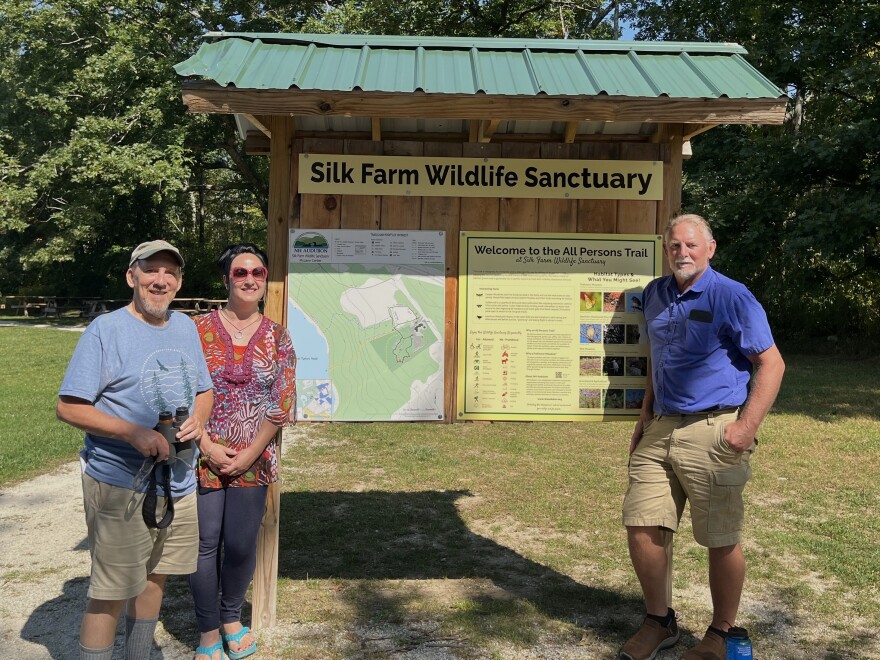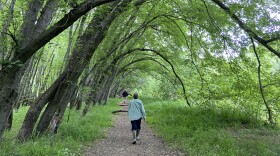We’re kicking off a three-part series looking at accessible trails designed to get more people outside in nature in New Hampshire. We’ll also explore how conservation organizations and individuals are working to ensure that everybody has access to the outdoors.
Today, the Something Wild team is at NH Audubon’s Silk Farm Wildlife Sanctuary in Concord, touring the pollinator meadow and the adjoining All Persons Trail. About two-thirds of a mile long, the trail winds through a pollinator meadow and grassland habitat, extending into the woods on the shores of Turkey Pond.
Something Wild Host Chris Martin points out that the path could be completed in about 15 to 20 minutes.
“But if you take time to look at each plant and examine what's going on on each plant, you can see so much more,” he says. “You can see all the different bugs that are there. Beetles are pollinators. Butterflies are pollinators. Moths are pollinators. Hummingbirds are pollinators.”
NH Audubon Community Outreach Coordinator Anita Fernandez led our recent in-person tour, but the organization is also rolling out an audio tour to enrich the visitor experience. So far, she says they have one “audio tour stop” ready to go, and they’re working on eight more. Once they’re ready, people will be able to scan a QR code on a kiosk to access audio, photos and more information about each stop.
“So even people who may experience hearing loss but still want access to the information will be able to get it,” Fernandez says.
Martin is also one of the voices of the audio tour for this newly expanded All Persons Trail.
“What I think is really cool is that if you have sight impairment and you want to fully appreciate all the things that the trail has to offer,” he says, “you can listen and get an interpretation of stops along the tour.”

NH Audubon converted roughly an acre of land into a pollinator meadow with native pollinator plants.
“We had to cover the ground with tarps so we could kill all the invasive trees or invasive shrubs and plants, then reseed and cultivate native plants,” said Martin.
The pollinator meadow is also a part of the Capital Area Butterfly Count in July, which Fernandez says is done in collaboration with New Hampshire Fish and Game and the North American Butterfly Association.
“This is one of the sites here at our pollinator meadow that we survey and find tiger swallowtails, a lot of cabbage whites, American lady, black swallowtails, red admirals earlier in the year,” she says.
Although most people associate a pollinator meadow with springtime or early summer, fall is a rich time for feeding pollinators, birds and insects.
“Look at the food that's out here right now in this weedy field,” says Something Wild Co-host Dave Anderson. “There's goldenrod, asters, oxeye daisy. This is probably filled with flocks of sparrows and especially goldfinches this time of year.”
One of the goals in creating the pollinator meadow was to provide flowering plants that would bloom throughout the spring, summer and into the fall to provide food throughout the year.
“There's a real need for birds to fatten up right now for migration,” says Martin. ”And the more rich food that's available, the better.”
Anderson notes another food source: insects.
“You can hear an audible hum of crickets and grasshoppers out here,” he says. “That will bring in crows and ravens and other insect eaters. An open spot like this is a food source almost year round. And that's why we ask people to leave places unmowed right into the fall, because they continue to provide pollen and nectar for the last meals of the year for the pollinators.”

The group heads into the forest, where the connector trail links up with the Forest Loop, the wooded portion of the All Persons trail, on the way to several chestnut trees, planted in an effort to restore chestnuts to U.S. forests.
Anderson admires the benches and large picnic tables.
“It's a thoughtful addition to trails,” he says, “for resting along the way.”
Fernandez says a volunteer group from Timberland, the New Hampshire-based footwear manufacturer known for its distinctive boots, provided the materials and constructed 16 ADA-compliant picnic tables.
“You can roll the wheelchair right into the middle,” notes Martin. “Not just at the end, but right in the midst of the group. It's wonderful.”
As the group returns to the pollinator meadow, Martin and Anderson watch cedar waxwings eating pokeweed berries.
“Look just how many invasives there are here,” says Anderson. “Half the things you're looking at are invasive plants, things that weren’t part of the North American forest 200 years ago.”
Martin reiterates that NH Audubon worked hard to eradicate the invasive plants three years and four years ago.
“And if we don't continue to manage this pollinator meadow actively, all those woody plants and the invasives will reestablish,” he says. “This is not one and done.”
In the weeks ahead, stay tuned as the Something Wild team visits other accessible trails around the state, including the Nature Conservancy's Manchester Cedar Swamp and the Great Bay Discovery Center in Greenland, which has a universally accessible trail in a salt marsh.
There are other many trails in New Hampshire that are all-access trails, including rail-trails around the state.
“It's part of a movement,” says Anderson. “And who doesn't belong in nature! This is a great thing for New Hampshire.”
Something Wild is a joint production of New Hampshire Audubon, the Forest Society and NHPR.











